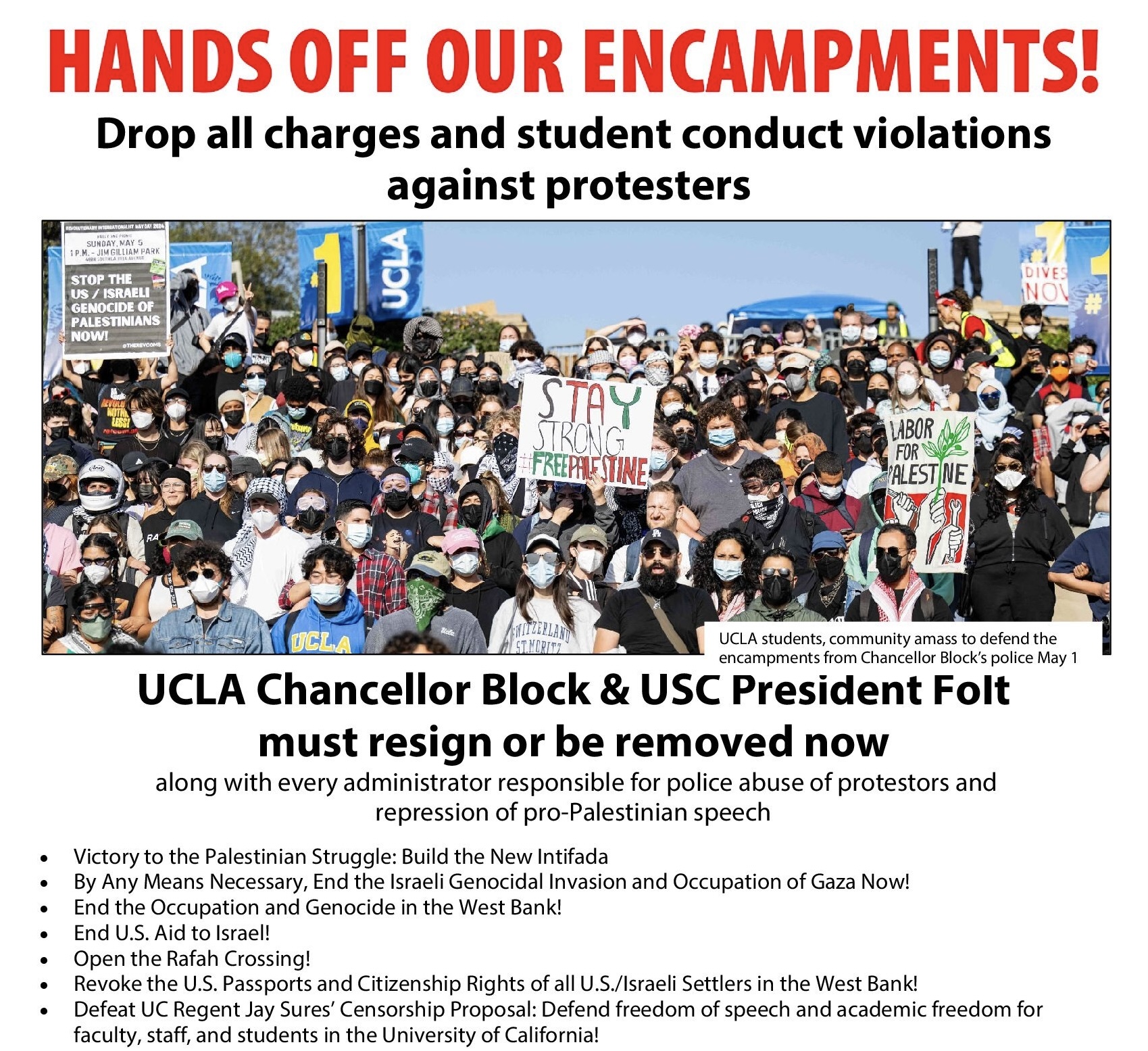 Click Image for PDF of full statement
Click Image for PDF of full statement
“Your blood is my blood. Your enemy is my enemy. Your struggle for freedom is my
struggle for freedom. Your dreams and hopes echo in my heart and mind. The borders that separate us will not divide us. We will win as one. We have the power to make this world into the world we want to live in. We can, if we act, create a new society in which the needs of humanity come before the enrichment of a few and for the first time in human history, human beings can finally think, love and socialize as equals while protecting and realizing the great potential of both human beings and all that inhabit this earth.”
From the BAMN Pledge
(bamn.com/bamnpledge)
Our movement is on the rise, in strength, boldness, and in consciousness. The
increased repression of campus struggles by University administrations, who have
relied on police brutality, coordinated attacks by far right and fascist pro‐Trump and pro‐Netanyahu thugs, and threats of severe reprisals to suppress any pro‐Palestinian speech and to crush campus‐based, youth‐led, independent mass anti‐war actions, are not winning. In fact, the actions of the Columbia University President to militarize her own campus and oversee the police beatings and arrests of her own students backfired.
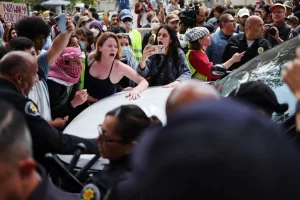
The movement for victory to the Palestinian struggle movement has continued to grow and get stronger. We are learning the lessons of how to fight and win from our own experiences in militant, bold, direct actions. We are experiencing rapid changes in our political consciousness. Our commitment to end U.S complicity in genocide and to get our University leaders to actually act on their purported humanitarian concerns is being tested in action. We are proving to ourselves, to the Palestinians fighting every day for their land and freedom, and to our parents, professors, peers, and people everywhere that we will do whatever is necessary to win this worldwide struggle for Palestine and all the oppressed.
Movements Mean Move
In the heat of mass struggles there is very little time to reflect on what we did that succeeded and what failed. Struggles to win are dynamic. A quick change of tactics at certain key turning points occurs. Opportunities to advance the struggle must be seized when they present themselves. There is rarely much time for discussion. People who have never met seem to act instinctively to protect each other, to act in unison, to follow the calls to action of the leaders whose tactics make sense. The movement’s activists’ and leadersʹ own consciousness of why they are doing what they are doing lags behind their will and determination to keep moving forward.
So it is critical to use moments when the immediate actions subside to reflect on, analyze, and understand what worked and what failed. It is often impossible for movements to even decide whether they are winning. What constitutes a victory is undefined. On the one hand, we have been fighting to maintain our encampments and defend free speech. But we seem to be losing on both those fronts. On the other hand, because we are fighting for so much, modest victories can be overlooked.
Our movement is winning in two decisive ways. The student encampments and the courage of thousands of students and community members to defend the encampments finally forced President Biden a.k.a. Genocide Joe to pause sending some large‐scale massively destructive bombs and artillery to Benjamin Netanyahu. For seven months, the Biden administration has colluded in genocide and the massive destruction of Gaza. Hundreds of Palestinians living on the West Bank have been murdered by American/Israeli settlers on the West Bank. And the Biden administration has done nothing meaningful to stop this. After months of unseemly blubbering and empty promises, Biden has actually been forced to make the first modest but significant break with the Netanyahu government. In case any of us doubted the role our struggle played in getting this to happen, Biden actually said he was responding to the student actions.
Our second victory is that we have inspired people in Palestine to keep building their new insurgency. We know how much our actions have meant to them. The new Intifada the Palestinians are building will give us more courage and determination than we ever knew we possessed. Students who have been activists in the international movement fighting for a Palestinian victory are following our lead and building encampments on their campuses. Any contribution that we can make to the worldwide pro‐Palestine anti‐war movement is worth getting some bruises for.
We are not done fighting. Gaza is still under constant bombardment and occupation by Israeli forces, armed by Biden and the U.S. government. We need to stop all military and economic aid going to Israel. We must fight for a Palestinian victory, not just a ceasefire. We need the Rafah crossing opened to get food, humanitarian aid, arms, and pro‐Palestinian volunteer soldiers into Gaza. We must continue to build our movement. We must build a national mobilization for the Democratic Party Convention. The pro‐Palestinian, anti‐war free speech encampment movements at USC and UCLA provide valuable lessons for young leaders of our movement eager to learn and determined to win.
The Centrality of the Campus Struggles in California
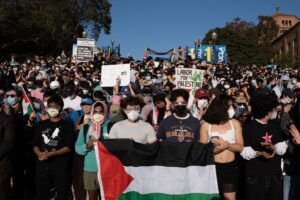
The University of California in Los Angeles (UCLA) and the University of Southern California (USC) became the focal point for the national movement, as the campus encampment movement spread from Columbia University westward.
The activists who built the encampments and the much larger crowds who rallied to protect the encampments were standing in solidarity with the students at Columbia and City College of New York. While the struggles initially focused on defending free speech, divestment, and ceasefire, they quickly became a new embodiment of the George Floyd movement. At UCLA in particular, the student struggle expanded into a movement opposed to a host of different forms of oppression. The UCLA encampment was also a defiant stance against the police.
The USC Struggles: The Start of the Turning Point in California for
the Pro-Palestine Movement
On April 15, the USC administration announced it was canceling the commencement speech of the 2024 valedictorian, Asna Tabassum, a pro‐Palestinian, Egyptian American USC student. This blatantly racist and Islamophobic decision by USC President Carol Folt prompted immediate student, faculty, and staff protests in support of free speech and lifting the gag order on Asna Tabassum. Student anger and mass actions grew until April 24, when students built a pro‐Palestinian encampment on the campus. About 100 students sheltered in the encampment, while thousands of students and community members turned out to protect the encampment.
The encampment faced two enemies: USC President Carol Folt and the campus police and LAPD who Folt ordered to arrest and brutalize USC students. The mass defense action of students and community members was prepared to take on both opponents. At one point, mass student defense guards surrounded a campus police squad car demanding the release of an arrested organizer. The chant “Let him go, let him go!” filled the plaza. Eventually the police had to release the student from their police car. Video of the un‐arrest went viral, leading to an even larger outpouring of support from students and the community.
In the end, 93 students were arrested. President Folt canceled the traditional commencement program altogether. Dozens of faculty members demanded the resignation of President Folt. It is imperative for the student movement to take up this demand. Our campus will never be safe or open to a free exchange of ideas unless we demand that President Folt resign or be removed immediately.
THE STRUGGLE TAKES A QUALITATIVE STEP FORWARD AT UCLA: The Struggle for Power Replaces Passive and Pacifist Appeals to Non-Existent Morality
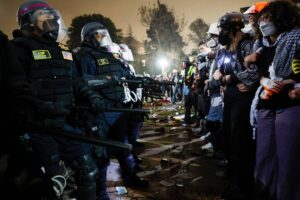
On April 25, a day after the LAPD assault on USC students, UCLA students set up their pro‐Palestine encampment. The battle to maintain the UCLA encampment went on for a week. Each day, the encampment faced escalating attacks from a sordid group of pro‐Netanyahu and pro‐Trump thugs. The violent, dangerous thugs grew into a violent, well‐armed mob which had the protection of the UCLA administration, and it coordinated attacks on pro-Palestinian demonstrators with the police. This meant that, as the week progressed, the pro‐Palestinian demonstrators—both those sheltering in the encampment and the thousands more who defended the encampment—were having their illusions in the neutrality of the UCLA administration, the value of peaceful protests, and the police constantly challenged, and in some cases stripped away.
The battle between the students opposing genocide and racism, fighting for equality, saving the environment, and standing with the oppressed on one side, and the pro‐imperialist defenders of Netanyahu and Biden’s genocidal policies on the other side, took the student struggle and pro‐Palestinian resistance movement in the United States to a higher level. UCLA played a decisive role in getting the Biden administration’s change in policy on sending weapons to Israel. It was the one struggle that chose openly militant armed self‐defense over pacifist victimization.
The pro‐Israel thugs attacked the encampment from day one. Each time, a call was made for the community to come support the encampment, and they did. The ragtag grouping of self‐styled supporters of Israel was held together by their support for white authoritarian rule and their hate of progressive students. The pro‐Trump and fascist elements were obviously anti‐Semitic, but this fact did not seem to trouble any of the mobʹs members.
Their ranks grew when it became obvious that they had the tacit support of the UCLA administration and a direct line with the police to coordinate attacks on the pro‐Palestinian protesters. On April 28, UCLA Chancellor Gene Block agreed to let the mob set up its own protest site about 100 feet away from the encampment.
By Tuesday, April 30, Chancellor Block released a statement declaring the encampment unlawful and threatening to suspend and/or expel students who chose to stay at the encampment. The chancellor’s declaration served as an open invitation to escalate mob violence. Starting that Tuesday night and going into the early hours of Wednesday, May 1, a group of 200 well‐armed right‐wing thugs attacked the encampment. They were better organized and confident they would not be arrested. They arrived carrying metal pipes, tasers, wooden planks, poles, bear spray, fireworks, and other weapons. They were given the unencumbered right to attack the encampment and the movement activists who were defending it for hours with no interruption from security or police. Twenty‐five students were hospitalized from the attack. To this day, no arrests have been made of any of the thugs who attacked the encampment.
By the morning of May 1, it was clear to the people inside the encampment and those protecting it from the outside that Chancellor Block had declared war on the encampment and would go to any lengths to destroy it.
Support for the thousands of Pro‐Palestinian student activists mushroomed. Stripped of their illusions in the administration, in the police, and in the Democratic politicians who did not condemn the bloody right‐wing assault and supported the repression and silencing of the Pro‐Palestinian movement, the students, standing for a Palestinian victory, decided it was time to militantly defend their right to be seen and heard.
There was never an open, democratic, mass meeting to decide the tactics for that night, which meant it was impossible to set specific priorities or work out a set of objectives. The student anti‐war movement against the war in Vietnam learned early on that democratic discussion and decision‐making was key to building a movement and critically assessing the aims and tactics of the movement. Security is always raised as a reason to restrict planning meetings to a small, select group of people with shared experiences. But the police always have spies and informers
and have the military training to assess what contingencies are likely to arise.
If there had been a mass meeting, at least one crucial decision could have been made: was it more important for the people in the encampment to go down fighting and ultimately take arrests, or was it more important to find a way to stand our ground and enlarge the number of people allowed into the encampment to slow down the arrests by enlarging our side of the battle while trying to get more reinforcements. In the end, the outcome may have turned out to be unchanged, but more activists would have learned the right questions to ask.
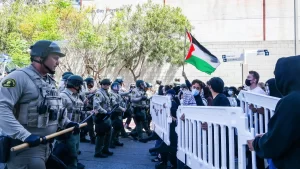
The Battle Between Two Diametrically Opposed Class Representatives: the Representatives of the Huge Majority of Oppressed People Throughout the World, and the Standard-Bearers for Imperialism, Human Slaughter, and the Destruction of the Earth
Throughout the day of May 1, the encampment was massively fortified. Thousands of pro‐Palestinian protesters arrived at the encampment that evening carrying helmets and goggles and wearing masks to protect their identities. Safety equipment was given to anyone who was prepared to be a front‐line fighter in or out of the encampment. Everyone knew that a massive confrontation with the police would take place that evening. The vast majority of the pro‐Palestine students and community members in the encampment had decided to take the next step in defending their convictions in action: better to go down fighting than give up an inch of ground to our enemies.
The defense guards on the outside of the encampment were also prepared for a physical confrontation. They saw their role in the division of labor to be stopping arrests and freeing arrestees from police custody. This battle at UCLA that occurred on International Workingmenʹs Day marked a turning point in the student movement. The chant “peaceful protest” was heard on so many campuses when the police were approaching the crowd to brutalize the protesters, and it was going to be our declaration of impotence and surrender. The chants at a UCLA football rally captured our sentiments far better.
Late on the evening of May 1, a double column of fifty or so LAPD officers in full riot gear in single file began to move from the staging area in the Murphy Hall parking lot towards the south side of the perimeter. Two hundred students rushed to the south Side, forcing the two columns of officers to retreat and attempt to enter the encampment from the north side of the perimeter. Once again, blocked by protestors, the police retreated and disappeared through a nearby building, Bunche Hall. The excitement of the first successful defense of the encampment was palpable; chants and cheers of pure joy and triumph rang in the air.
Pro‐Palestinian militants outside and inside the encampment battled the police for 17 hours. The police repeatedly attacked the crowd with stun grenades, tasers, pepper spray and different variations of brute force. But we stood our ground, trying to stop every arrest, every act of destruction of the encampment until all the 200 protestors who were arrested were taken away, and our encampment was completely destroyed. We lost our encampment but won a much bigger victory. After months of aiding the Israeli genocide in Gaza and the West Bank, President Biden finally took a first step to withhold some military aid to Israel.
We are becoming a new generation of movement leaders capable of guiding our movement in the streets and on our campuses—where our real power is. The Palestinian struggle continues in Gaza, the West Bank, and East Jerusalem. The plan of the Netanyahu government to use genocide, starvation, torture, and the massive destruction of housing and infrastructure to depopulate Gaza so that it can never be a part of an independent Palestine, is failing. The courage, resolve, and commitment to building independent committees of action to counter Israel’s death machine is a call to action for all the oppressed. We can proudly say our movement has answered this call.
Learning From Our Own Experience in the Dynamics of Struggle
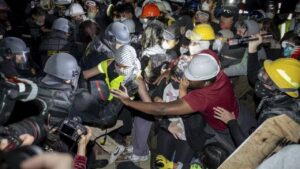
We learned a series of important lessons from the UCLA and USC encampment struggles. With every new development, the movement faces a new set of opportunities and challenges. The movement is young, but people are learning quickly from each other and are growing from our collective experiences.
The university administrations also try to learn how to quell struggles from the experience of other university administrators. The UCLA administration had the advantage of seeing from the struggle at USC that an outmoded civil disobedience action could quickly transform into a militant action against the police.
At USC, the students outside of the encampment dictated the tactics of the day, and not the designated pre‐determined arrestees. This was a new and important development because it showed that the huge number of students and community members who turned out could not be controlled by the students in the encampment. It also demonstrated that relatively privileged college students would have no hesitation to put their bodies and careers on the line to stop the horrific genocide they witnessed every day.
Every young person in America hears the question what type of person witnesses genocide and does nothing to stop it. Well, the student and pro‐Palestinian activists in the movement across the country want to make damn sure that our names never end up on that list.
Transforming Our Identities As Leaders
The tools and methods developed to overcome today’s obstacles and advance the struggle can quickly become outdated and be more of a hindrance than a help.
Our problem on May 1 was that a hard‐fought defense of the UCLA encampment from the assault of the alt‐right/pro‐Israel vigilante mob became something the encampment occupiers were relatively well‐prepared for. The encampment steadily built up an impressive barricade fortification. However, these same fortifications ended up providing a tactical advantage to the police operation for the forced removal and mass arrest of the encampment because it created a physical separation between the encampment participants and the student and community support mobilized for its defense. The crowd on the outside was determined to try to find a way to insert itself in between the police and the encampment, but these efforts were limited in important ways by the overall terrain. Once the police had secured access to the adjacent buildings, they had largely cut off the encampment, or at least 3 sides, from the mobilized support, and they could attempt to wait the crowd out while preparing for their offensive.
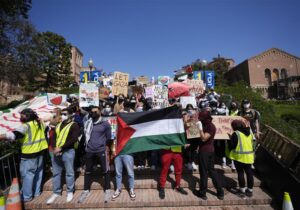
The disadvantage our movement faced with the tactical layout of the barricades and police lines during the fight to defend the UCLA encampment was the physical manifestation of terrain and the inexperience of our movement. But our movement’s illusions in the UCLA administration and the evolution of its political objectives changed through the struggle.
When the encampment was set up on April 25, it was a small but respected action. The point of the encampment was to create a divestment dialogue with the administration. This relatively‐modest aim assumed that the administration itself could be convinced to divest based on a combination of moral, practical, and economic sound arguments. The administration has diametrically different priorities, including protecting Biden and the Democrats from an independent anti‐war movement that is, at its base, anti‐imperialist. If the student struggle for divestment became successful, then the equivalent demand on the Biden administration to stop sending arms to Israel would gain traction. In fact, it has not only gained traction, but has begun to shift U.S. policies in the Middle East.
A movement premised on setting up respectable and responsible discussions with a university administration on where to invest their capitalist largesse can be relevantly small and insular. But when that movement evolves into a struggle to end the Israeli occupation of Gaza and the West Bank, to end direct U.S. involvement in genocide, and for the victory of the Palestinian struggle, it grows in numbers, resolve, and audacity. Our aims, demands, and movement expanded tremendously, but we were caught somewhere in between thinking like leaders of a small movement with a single demand, to leaders of militant mass movement that understood that the administration was our enemy.
This problem was reflected in the political problem of drawing a false distinction and separation between the activist cadre participating from inside the encampment and the larger, student, and community base of the anti‐war, pro‐Palestinian movement as a whole on the outside. Again, while the self‐enforced, vouching system to limit encampment access arose as a reasonably effective defensive measure taken in response to police and racist provocateurs, it simultaneously had the unintended consequence of creating and reinforcing an artificial separation between the encampment and the broader base of student and community support. It could be said of our efforts that evening at UCLA, that to defend our encampment, some of our own walls needed to come down.
While the police were ultimately successful in clearing the encampment by the morning, the fact that the movement was fighting to win, self‐organizing, and taking independent mass action throughout the entire police operation, testing out where to go, what to do, how to advance the struggle, and how to intervene in a way to shift the balance of power, meant the people themselves were learning through their own experience how to be the fighters and leaders the movement needs.
In the days following the May 1–2 clearing of the UCLA encampment, we have already seen examples of demonstrations and marches learning from the movement’s collective experience, taking independent action to breach police barricades encircling encampments and responding to arrests by surrounding police cars and buses demanding the release of detained student protesters—with notable success in some places, as in USC. Wherever the movement can overcome the artificial divisions imposed, psychologically and physically, is and will be an opportunity to change the whole dynamic and outcome of a given conflict or struggle.
The completely unhinged, zero‐tolerance policies of the UCLA university administrators and their like‐minded counterparts is a sign of fragility and weakness. The continued crackdown is not only against anti‐ racist, anti‐war, pro‐Palestinian student demonstrations and activists, but is taking the form of a near‐universal ban on any and all “free speech” by students, faculty, and staff so long as the content of that speech is telling the obvious and plain truth about the genocide, atrocities, and war crimes being committed in Gaza, asserts Palestinian equality, and supports the Palestinian struggle for freedom. These policies are untenable, and the new student movement can and will make them unenforceable.
The strike authorization vote being put to the membership of UAW 4811 (the graduate student and academic workers in the University of California system) in response to the police crackdown on the encampment and brutality used against pro‐Palestinian student protesters at UCLA, UCSD, and other campuses is an important development for the movement and has the potential to draw more forces from organized labor into struggle. At the same time, this opportunity to expand the movement and assert more of our own strength comes with its own set of new potential dangers.
The movement has to be especially vigilant not to turn over its own independent organizing, actions, demands, and methods of struggle to a union leadership whose aims and methods and demands will be necessarily constrained by existing legal agreements with the University. However, a dynamic, fluid relationship between the broader student movement as a whole and the forces the union can mobilize for the upcoming upcoming actions or demonstrations will be an important arena to build the struggle further, continue our process of learning and development, and continue the fight to stop the genocide in Gaza, end the U.S.’s military aid to Israel, defend free speech and academic freedom in defense of Palestine, and force every single one of these university presidents and chancellors who have called in the riot cops to suppress student protest to resign or be removed.
Long live the student intifada! Victory to the Palestinian struggle!
May 15, 2024
